 Petzlover
Petzlover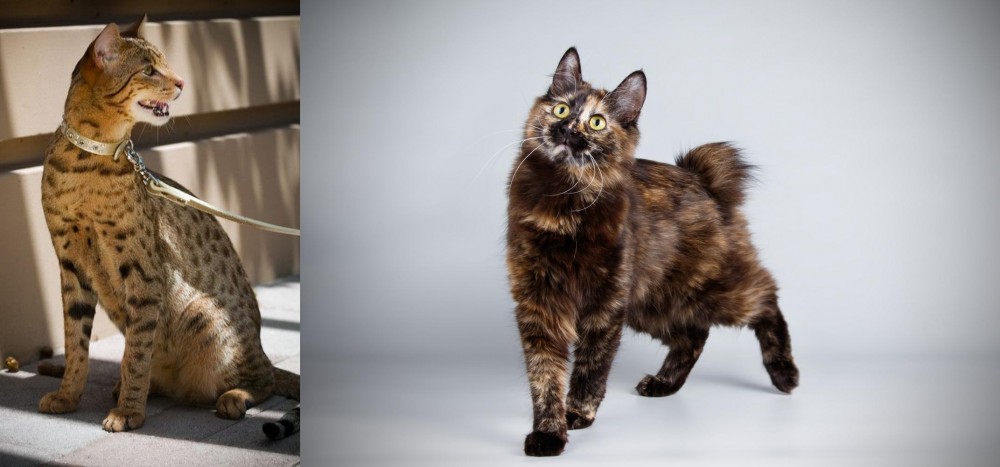 Ashera is originated from United States but Japanese Bobtail is originated from Japan. Ashera may weigh 8 kg / 18 pounds more than Japanese Bobtail. Ashera may live 10 years more than Japanese Bobtail. Ashera may have less litter size than Japanese Bobtail. Ashera requires Moderate Maintenance. But Japanese Bobtail requires Low Maintenance
Ashera is originated from United States but Japanese Bobtail is originated from Japan. Ashera may weigh 8 kg / 18 pounds more than Japanese Bobtail. Ashera may live 10 years more than Japanese Bobtail. Ashera may have less litter size than Japanese Bobtail. Ashera requires Moderate Maintenance. But Japanese Bobtail requires Low Maintenance
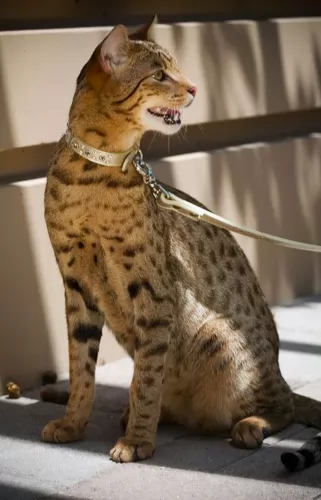 Hailing from the USA, and looking similar to the Savannah Cat, the Ashera is a hybrid breed of cat - an exotic domestic cat known as a designer cat that came about by crossbreeding the African Serval and the Asian Leopard cat.
Hailing from the USA, and looking similar to the Savannah Cat, the Ashera is a hybrid breed of cat - an exotic domestic cat known as a designer cat that came about by crossbreeding the African Serval and the Asian Leopard cat.
In fact, the cat was developed fairly recently through genetic manipulation and by the Lifestyle Pets laboratory. Also, some domestic cat was added to the mix as well, giving the cat a beautiful spotted coat similar to that of a leopard as well as some stripes.
Lifestyle Pets stopped producing these cats in 2008 so they’re hard to come by and are very expensive.
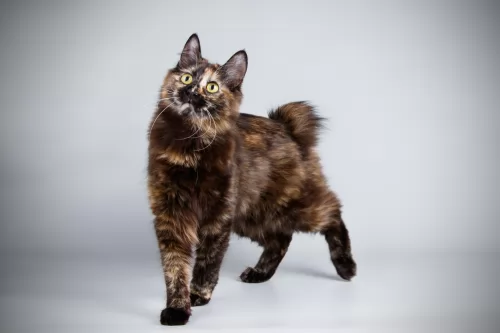 It is believed that these naurally-occuring short-tailed domestic cats in Japan arrived from the Asian continent about 1 000 years ago.
It is believed that these naurally-occuring short-tailed domestic cats in Japan arrived from the Asian continent about 1 000 years ago.
It was way back in 1602 that the Japanese authorities made it that all cats be released to tackle the rodent problem that were threatening the nation's silkworm population.
Bobtail cats were the street cats of Japan. In 1968, the cat was imported to the Western Hemisphere from Japan and in 1976 the shorthaired Japanese Bobtail was accepted for Championship status in the Cat Fanciers’ Association.
There are a number of cat’s breeders in North America and Europe, but it is still a rare cat. Today, the Japanese Bobtail is a recognized breed by all major registering bodies.
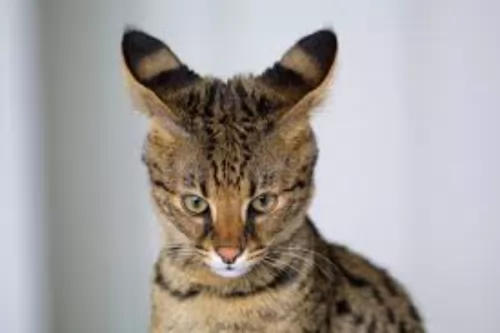 The Ashera cat has large ears with stripes and which are slightly rounded at the top. The eyes are a beautiful greenish-yellow shade.
The Ashera cat has large ears with stripes and which are slightly rounded at the top. The eyes are a beautiful greenish-yellow shade.
It's a large cat and can weigh as much as 14kg. The length of the body is long too and can be more than one meter in length. The cat is tall and if it stands up on its hind legs, it will be able to put its front paws on the shoulders of an adult.
People have always fancied owning such a large ‘domestic’ cat. There are different kinds of Ashera cats – the hypoallergenic one, the common Ashera, the snow Ashera, and the royal Aashera which looks much like the common Ashera but just a more rare type.
The Ashera is a very intelligent, independent cat and likes to climb, being a very playful cat, enjoying the company of children.
Because of its wild side, it's always on the lookout for prey. In spite of the cat’s size, it is an amicable cat and will even enjoy going on a walk with a leash. It’s not your traditional aloof cat and is both sociable and vocal and some people liken them to dogs.
Even though the cat enjoys the company of its human family, it doesn’t mind being left alone.
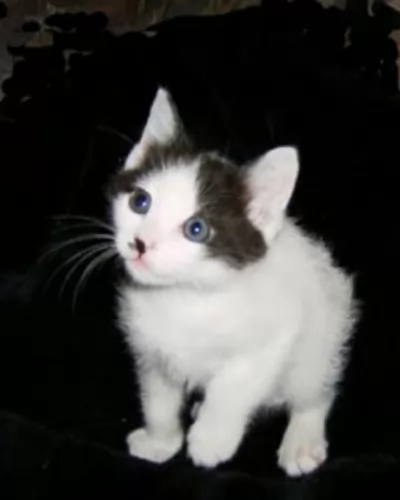 The medium-sized, long, lean and muscled Japanese Bobtail, with long slender legs, is known for its unusual bobtail. People liken the tail to that of a rabbit. The tail must always be visible though.
The medium-sized, long, lean and muscled Japanese Bobtail, with long slender legs, is known for its unusual bobtail. People liken the tail to that of a rabbit. The tail must always be visible though.
The head has a triangular shape and the neck is neither too long or too short. The ears are upright and set wide apart. The oval-shaped eyes are large.
The hind legs are longer than the front legs. The cat weighs between 3 and 6kg and comes in almost any color and pattern but it is thought that the triple-colored ones are the most favored in Japan.
The coat is of medium length and is soft and silky. The head of the cat is triangular with the ears being large and wide apart. The eyes are large and oval-shaped.
The Japanese Bobtail makes a good feline pet for families. They get on well with children and are affectionate and loving with all their human family members.
They’re talkative cats too, enjoying communication with people and using soft noises. It’s an intelligent cat and one that happens to love water too, and is a playful cat, making a great loyal companion.
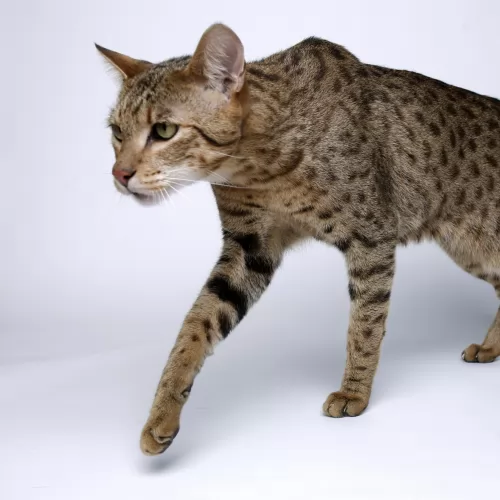 The Ashera cat is beautiful alright but you might battle to get hold of one and they cost a fortune too, being the rare breed it is.
The Ashera cat is beautiful alright but you might battle to get hold of one and they cost a fortune too, being the rare breed it is.
Hybrid cats mean that the breeding of cat species that would never have mated in the first place.
Wild cat breeds belong in the wild. They’re solitary by nature and if they battle to adjust to being in a social setting they land up in a shelter, abandoned as ‘bad news’. People aren’t clever tampering with nature particularly when it’s just to feed the ego of humans who want something unusual and exotic that nobody else has.
There are pet owners who are willing to spend enormous sums of money to own a rare cat such as the Ashera.
If you want an Ashera, there are just a few kittens being made available each year. One thing is sure, they make splendid pets, being playful, loyal, intelligent, and affectionate.
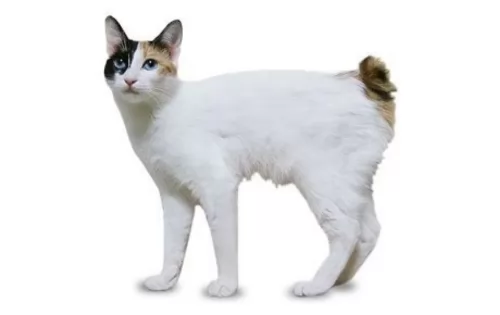 The Japanese Bobtail is such a sweet, playful, loving cat. The cat loves to be with his human family and is highly intelligent.
The Japanese Bobtail is such a sweet, playful, loving cat. The cat loves to be with his human family and is highly intelligent.
They are quite capable of learning tricks and playing games much like a dog. They are social cats and while they aren’t lap cats, they seek out the company of their human family, making use of a soft voice to communicate.
They’re such sweet cats and are adored by those who have brought them into their home as a pet and friend.
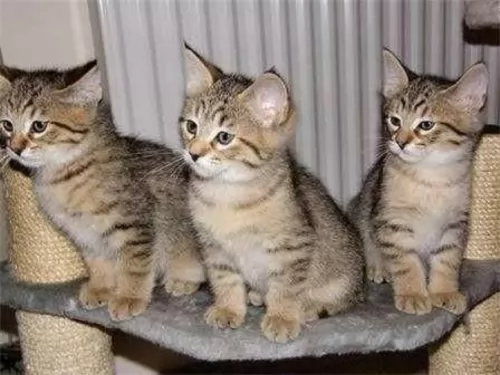 The scientists involved with the development of this cat tell us that it can reach up to 25 years of age.
The scientists involved with the development of this cat tell us that it can reach up to 25 years of age.
It’s a new cat breed and at this time there are no common diseases that affect this beautiful feline.
Remember that these cats come with an insurance policy and this means that the cat’s veterinary visits will be covered for the entire first year of its life. Your Ashera cat will also be vaccinated and chipped and the cat will have been spayed or neutered before he comes to you.
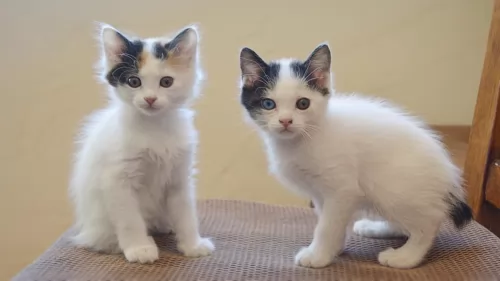 Just like any other cats, the Japanese Bobtail suffers from any one of the different health problems there are. The Japanese Bobtail is a healthy cat generally and he can easily reach 15 years of age with good care.
Just like any other cats, the Japanese Bobtail suffers from any one of the different health problems there are. The Japanese Bobtail is a healthy cat generally and he can easily reach 15 years of age with good care.
Look out for obesity. Obesity comes with a host of health issues, putting a strain on the cat’s joints as well.
You want to manage your furry friend’s food portions to ensure he remains lean and muscular. Feed your adult cat twice daily. Discover what your cat likes in terms of dry cat food, semi-wet or wet cat food.
Your cat is a carnivore and requires quality meaty foods. The best, high-quality cat foods always have meat at the top of the ingredients list as they need meat to get all the right nutrients in.
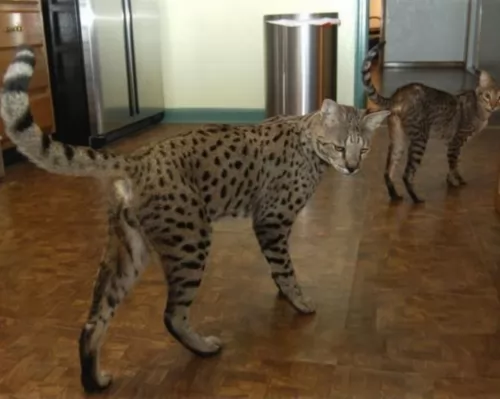 The Ashera doesn’t need any special food as they will eat the same cat food that your other cats eat. If you feed your cat commercially manufactured food, make sure its food that is of a high quality.
The Ashera doesn’t need any special food as they will eat the same cat food that your other cats eat. If you feed your cat commercially manufactured food, make sure its food that is of a high quality.
Those who have owned an Ashera cat, say tthat looking after an Ashera is much the same as lookijg after your regular domestic cat,
These cats like warmth so make sure you provide him with a warm blanket in his sleeping area.
You won’t have to worry about spaying or neutering your Ashera cat, as they are sterile. The ony place you can buy this cat is from the Lifestyle Pets laboratory. The laboratory implants a chip into the cat and they also undertake to vaccinate the cat for a year.
It’s a low maintenance cat and you can brush the short coat from time to time. Ensuring a good diet will bring about a lustrous, healthy coat.
The cat is intelligent so it will require toys that get him thinking and working things out. Also supply the Ashera with a scratching post.
They Ashera will need the best kind of cat food there is and you will want to ensure he has a good intake of protein and fats to maintain his gorgeous coat and his muscles.
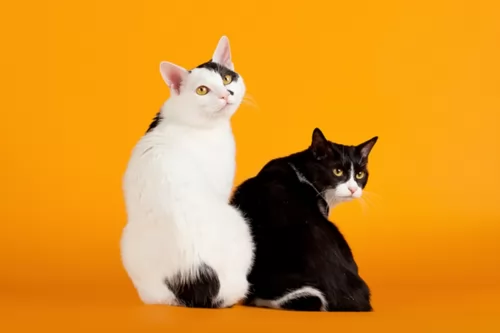 The cat’s medium coat sheds moderately, and a brush once a week to remove the loose hairs will be sufficient. You’ll want to brush him more often during his shedding seasons.
The cat’s medium coat sheds moderately, and a brush once a week to remove the loose hairs will be sufficient. You’ll want to brush him more often during his shedding seasons.
Help with keeping your Japanese Bobtail clean by scooping his droppings out of the litterbox at least every day and also changing the litter at least every week.
When you bring your Japanese Bobtail kitten home, you’ll have to take him to the vet. This is because from 8 weeks of age your kitten will need to get his first vaccines. Booster vaccines for your cat will also be required later on.
Provide your cat with a scratching post to prevent him from scratching your furniture.
Never leave your Japanese Bobtail without a constant supply of fresh, cool water.
Wash your cat’s water- and food bowls every second day to prevent bacteria from building up.